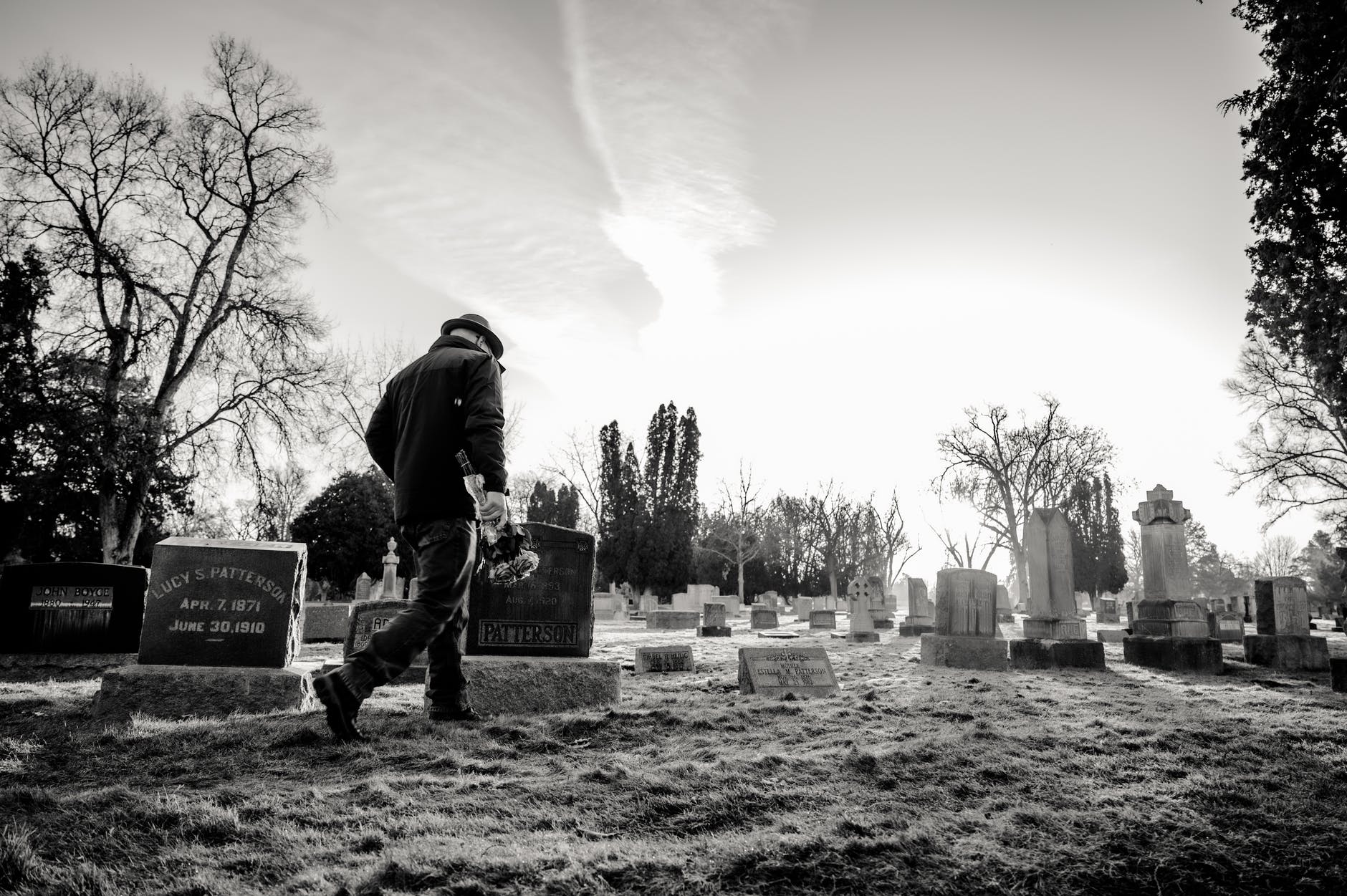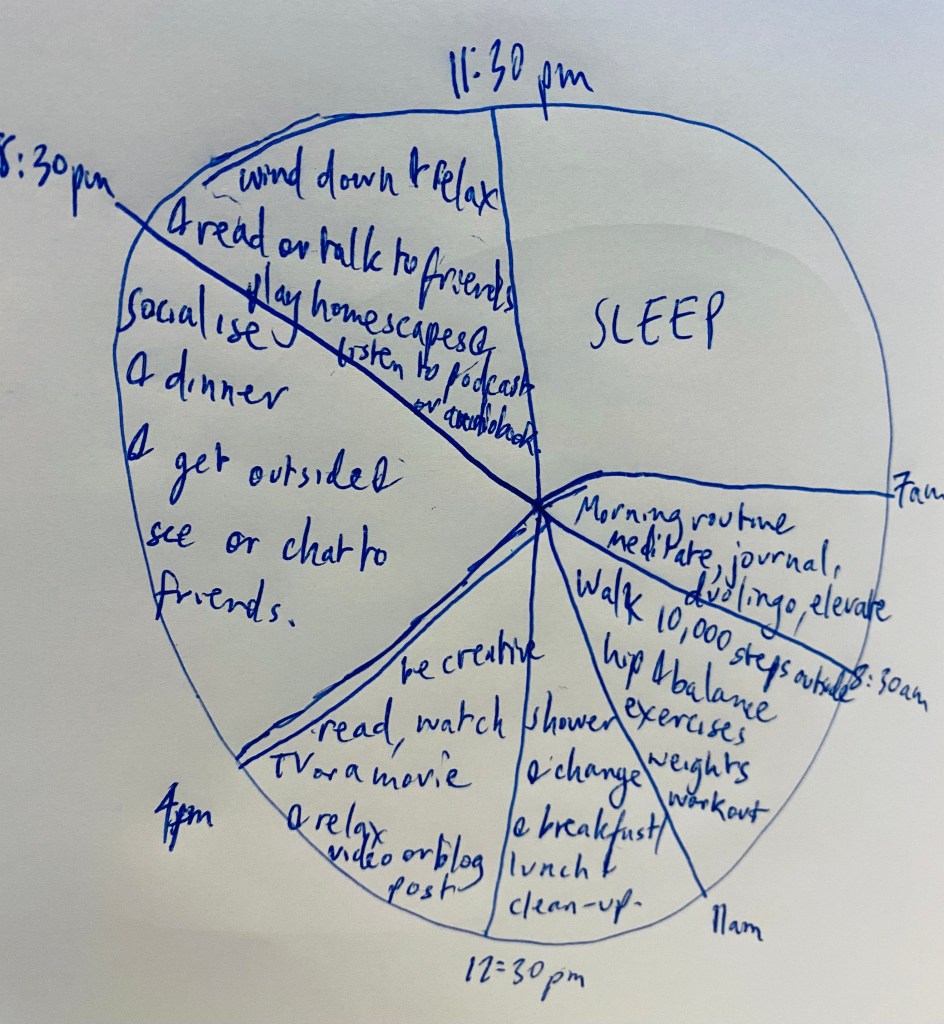It’s quite strange. Yesterday, I managed to finish off the last thing on my to-do list for the week. For the first time in a long time, I had nothing that I had to do. Sure, there are some things that I would like to do in the future. However, nothing required me to take any steps towards them until Friday next week. This is definitely the first time that this has been the case in 2021. I’m not even sure if I reached this point at all in 2020.
I feel lighter to have all of these items gone. They are no longer hanging over my head or telling me that I shouldn’t be relaxing when I am. But I also feel a bit lost. Today, I have already done my morning meditation, journaling, Elevate brain training and Duolingo French language training. I then did my daily weight training, hips and balance exercises, and went outside and walked 10,000 steps. I shopped for the food I needed at the local supermarket, meal prepped for the next few days, and cleaned up my place.
I then tried to relax and watch some TV and a movie, but both of these activities already felt boring. One of my friend’s said that he had clocked Netflix because of this pandemic. I haven’t, but the returns of these activities are definitely diminishing.
My brain told me that I would feel amazing, no longer having anything that I needed to do. But I do not. So now, having just eaten half a salad and a tasty Magnum ice cream, I find myself here at the computer putting down my thoughts into words.
Goals vs Values

Exactly how I feel now is why I tell my clients not just to live their lives by their goals. Sure, having things to aim for is great. So is hitting these targets and crossing these items off our to-do lists. It gives us a nice little surge of dopamine and fires up the reward pathways in our brain when we achieve something. And our brains feel good for a temporary moment until we start searching for the next target to hit.
But it is never-ending and generally always future-focused. We think, once I have achieved this, then I will be happy. But then we meet this goal, and our brain says, “great… what’s next?” We begin looking again to the future for the imaginary thing that will make us happy and satisfied forever once we achieve it.
Unfortunately, the long-term rewards of this future goal are mostly a mirage. Our brains telling us that it will satisfy us forever helps us not give up pursuing the goal. However, once we have achieved it, the reward is fleeting and less satisfying than we imagined beforehand. This is because dopamine is more about desire than reward.
Imagine if we were forever satisfied after achieving a goal. I doubt that our ancestors would have lasted long enough to reproduce. A slightly unsatisfied person, always craving for more and an ideal future that never comes. Those humans are the ones that will keep moving, growing, meeting and breeding. And now, here we are…
Enjoying the Process vs Desiring a Future Outcome

As I have already said, a goal is set for the future. You want to lose weight, buy a house, run a marathon, or climb Mount Everest. As an extension of this, you are saying that you lack something in the present when you set a goal. You are heavier than you want to be. You don’t have the house that you want to be in. You haven’t run the marathon this year, and you are yet to climb the tallest mountain in the world.
Values are different to goals. Values are followed in the present. They are guiding principles for life. You are either living by them at the moment, or you are not.
By clarifying why you want to achieve your specific goals, you can determine if you are living by these values in the present or not. Let’s take the first example. You might want to lose weight because you value looking attractive, but I want to lose weight because I value being healthy. I have lost weight through not eating much, not exercising and taking diet pills. The goal has been achieved, and if it was you, you might even live by your values. But I am not. Deep down, I would know that I am not healthy, and even if I have lost some weight, I would feel inconsistent rather than consistent with what is most important to me.
You might want to climb Mount Everest because your husband is too and you value doing things together, whereas I am training for it because I value pushing myself to reach my potential. We both head off on the expedition, and we can’t climb beyond base camp because our guide says that the weather is too bad for the next few weeks. Because I am unable to live by my value, I feel disappointed and unhappy. Because you are still consistent with yours, you are happy and don’t mind getting to enjoy your downtime in Nepal with the love of your life.
What Do You Want Your Legacy to Be?
This question needs to be asked more often, in my opinion. I’m not too sure how many people could answer this clearly and succinctly. But if we aren’t clear on what principles or values are most important to us, how are we meant to decide if we are on the right path or not? How will we know if what we are doing is time well spent or just a waste of time?
Epitaph On Your Gravestone

Imagine that you have lived your whole life and have recently died. Someone really close to you has decided to bury you, and they are deciding what will be written on your gravestone. What would you want them to write?
If you aren’t sure what you would want your legacy to be about, this question can often help. Even though I would prefer to be cremated instead of buried, the main thought that pops into my head when I think of this exercise is:
“Here lies Damon…He tried his best”
Maybe that is cliched or lame, but it highlights that a core value in my life is around effort. I care much less about how much I manage to achieve in my life. I want to know that I gave things a proper go and put in the effort required. That I focused on the process of what I am doing, which is within my control, rather than the outcome, which is often outside of it.
Your 80th Birthday Party
If thinking about after your own death is too morbid an exercise for you, this thought experiment may be more appealing. Imagine that it is your 80th birthday party, and all of your closest family and friend’s are there to celebrate the life you have had so far. Someone close to you stands up and tells everyone in the crowd about the person you have been from now until your 80th birthday. What would you want to hear them say about you? I’d love to hear my partner’s daughter stand up and say:
“Even though I wasn’t convinced about Damon initially, he’s turned out to be a pretty cool role model as a father figure for me. He’s consistently been there for me and tried his best to be emotionally supportive and understand me and what I was going through. Damon’s always wanted the best for me in life, and I could feel this. But he also didn’t care if I won things or where I came as long as I was willing to try and give new things a go. Damon was always willing to do things for me and be there when I needed him to help or listen. But he also didn’t do things for me if he knew that it would be better for me to give something a go and learn how to do it myself. Damon encouraged me to explore the world and not be held back by fear. He also offered a safe space with mum to come back to when I needed comfort, care and support. I’m glad that Damon came into my life, and I am happy about the person I am today partly because of the role that he has played. Above all, I feel loved for who I am by Damon, no matter what, and that is a pretty cool thing to have. So thank you, and happy 80th birthday!”
Your answer to this question should help you clarify what values are most important to you or what you would like your legacy to be about. Based on the above passage, I want to be a good role model as a father, present, supportive, understanding, encouraging, helpful, loving and unconditional. Many people think of their legacy in terms of work, but is that really what you value most in this life?
Are You Travelling in the Right Direction?

In her excellent post and subsequent book, Bronnie Ware shared her top five regrets of people who were dying. Having worked as a palliative care nurse for several years, Bronnie identified them as:
- I wish I’d had the courage to live a life true to myself, not the life others expected of me.
- I wish I hadn’t worked so hard
- I wish I’d had the courage to express my feelings.
- I wish I had stayed in touch with my friends
- I wish that I had let myself be happier.
This list highlights that my life was imbalanced before I had my stroke in January. Because of the COVID-19 pandemic, I was separated from my partner and her daughter back in Vanuatu on March 20th, 2020. I could not see any of my friends or colleagues back there and did not say a proper goodbye to them. Thanks to the months of lockdowns in Melbourne, I could not do many things I enjoyed or see my friends and family here in Australia that I wanted to either. I was working too much for too long each day, spending too much time on my phone and watching TV, and wasn’t eating as healthily or being as active as I wanted to be.
What about you?
How Much of the Day Are You Spending in the Way that You Want?
For this exercise, draw a pie chart of what a typical workday looks like for you and another pie chart for what a typical day off looks like. It doesn’t matter what time you go to bed or get out of bed or start and finish work, because the whole pie represents 24 hours.
When you are drawing your two pie charts, think about:
- How much time are you just in the moment vs trying to do things for a better future?
- How much are you socialising and connecting with others, including family and friends?
- How much time are you spending inside vs outside in nature?
- How much are you dedicating towards being physically fit or exercising?
- How much time are you resting, sleeping and relaxing?
- How much are you dedicating towards doing creative or fun vs passive hobbies?
- How much time are you working and doing tasks related to work?

Above is an example pie chart that I drew up in less than five minutes, so it really doesn’t have to take a long time. For some people, their workdays and non-workdays are very similar. For others, their weekend’s are spent very differently. There are no right or wrong answers. The key is to draw down what is typical for you.
Now that these pie charts have been drawn up, reflect and ask yourself:
- Are there things that you would like to do more of?
- Are there things that you would like to do less of?
- What’s making it hard or stopping you from making these changes?
Once you have identified what you want to change and why the most important thing is getting out there and starting. Behavioural change is hard, especially at the start. But as Zig Ziglar says, “no one just walks around and finds themselves atop Mount Everest“. If you try something new and get stuck, my next blog post will give you a few tips and tricks to overcome these barriers.
The best thing about living by our values instead of just chasing after goals is that this can happen at any chosen moment. It doesn’t have to be New Years Day, and it doesn’t have to take a long time. I want to be more creative and present and connect more with those I care most about starting now. I don’t want work, focusing on the future or distractions on my phone or TV to get in the way.
What about you?
Dr Damon Ashworth
Clinical Psychologist

I retired last spring after decades of giving my all to my parents, husband, children, grandchildren, employers, co-workers, and clients (anyone but me). If someone were to write anything about me now, I hope that they would write that I do not regret anything I did for others over the years – but I am happy to have time for me now. I have learned to really love and appreciate my life.
LikeLike
Thanks for the comment. That sounds great. I’m really happy to hear how much you love and appreciate your life now!
LikeLike
Thank you! I am glad you are recovering from your stroke. That was a fascinating read. I am surprised that even someone from a medical field could be misdiagnosed and ignored so many times. You are fortunate you finally received the help you needed and survived.
LikeLike
I honestly have no idea, lol .. I think my “to-do-lists” do end for study and things like that. Mainly because you have to have everything done by a certain time. But out of study “life” stuff, never stops, lol
LikeLike
Yeah, that’s interesting. Simon Sinek talks about the difference between finite games, where there is an endpoint and a winner, and an infinite game, where there is no winner and things keeps going. I think life stuff, especially relationships, more often fit into the infinite game category. So living by your values in these settings rather than just setting goals makes way more sense!
LikeLike
Which reminds me, I have to check some homework, haha
LikeLike
I have to admit, I haven’t ever thought about setting a to-do list, week by week. I normally make a list of what needs to be done and what doesn’t get done gets carried over. It might help me focus more and finally find some time for myself. Thankyou for this great idea!
LikeLike
You’re very welcome!
LikeLike
If you are strict enough to only have on your to do list what you value and what brings you benefit in the first place, it can feel quite nice to get it to zero. Whenever I achieve this I immediately look at my ‘someday’ list and bring something I’ve always wanted to do into the today.
LikeLike
That’s a great idea to look at the someday list and grab something off there. It doesn’t feel horrible to finish everything, but it’s not nearly as good as my brain imagines it!
LikeLike
I think you deserve more than a single like star on this one. You wrote five great posts – one on top of the other. I’m with you in believing that goals are either sources of frustration or fleeting moments of triumph. I’d rather develop lifelong habits based on solid values.
LikeLike
Thanks, Michael! I definitely agree that habits based on values produce much longer-lasting satisfaction than just having goals or to-do lists
LikeLike
What a relatable post. I don’t completely agree for I believe my values are almost inextricable from my goals/work, or to put it another way I feel like being in the now when I’m working and learning things. But there are obviously some things that I’d like to do in my day which I currently don’t. It is hard to settle at an equilibrium.
LikeLike
What a nicely composed article! Yes, I do believe that goals and lists can be sometimes frustrating and compelling. I don’t go with lists most of the time, but I do believe in living my life to the fullest.
LikeLike
Amazing Blogpost!
LikeLike
Thank you!
LikeLike
I often use what my obituary might say as a tool for life-decisions. (But I don’t like dwelling on my death) I will give the 80th birthday scenario a try instead. Inciteful post, thank you! 🌺
LikeLike
Thank you. I hope that you find the 80th birthday scenario useful too!
LikeLike